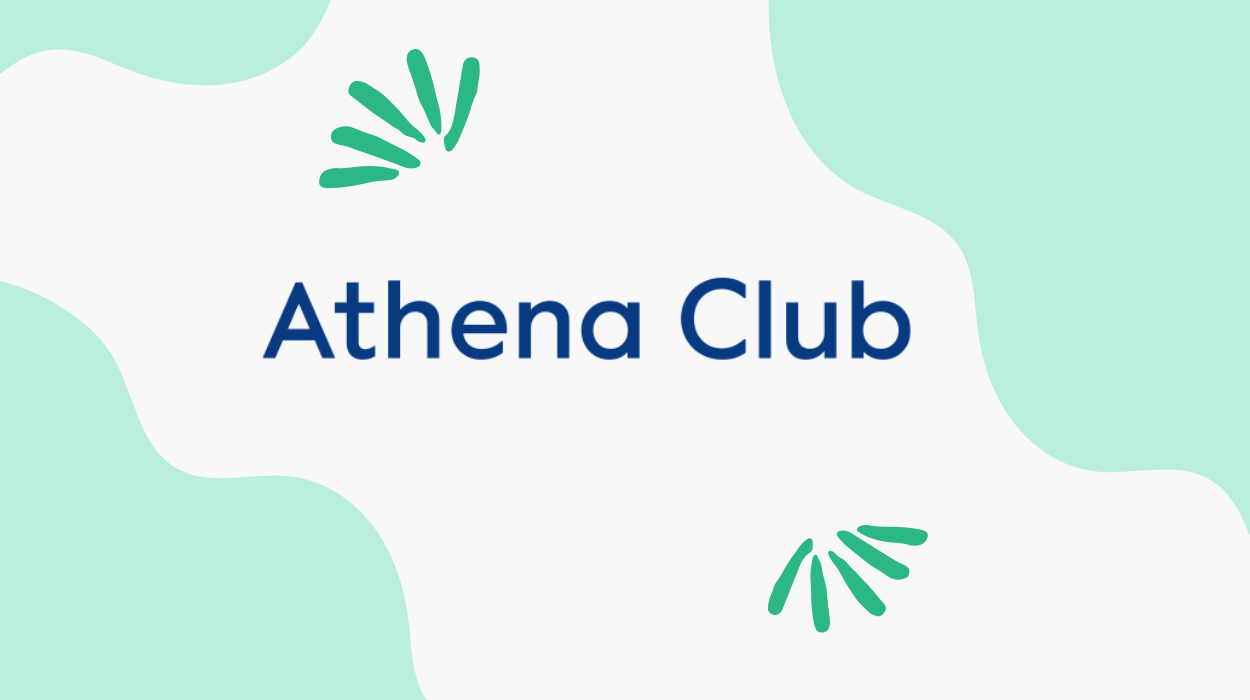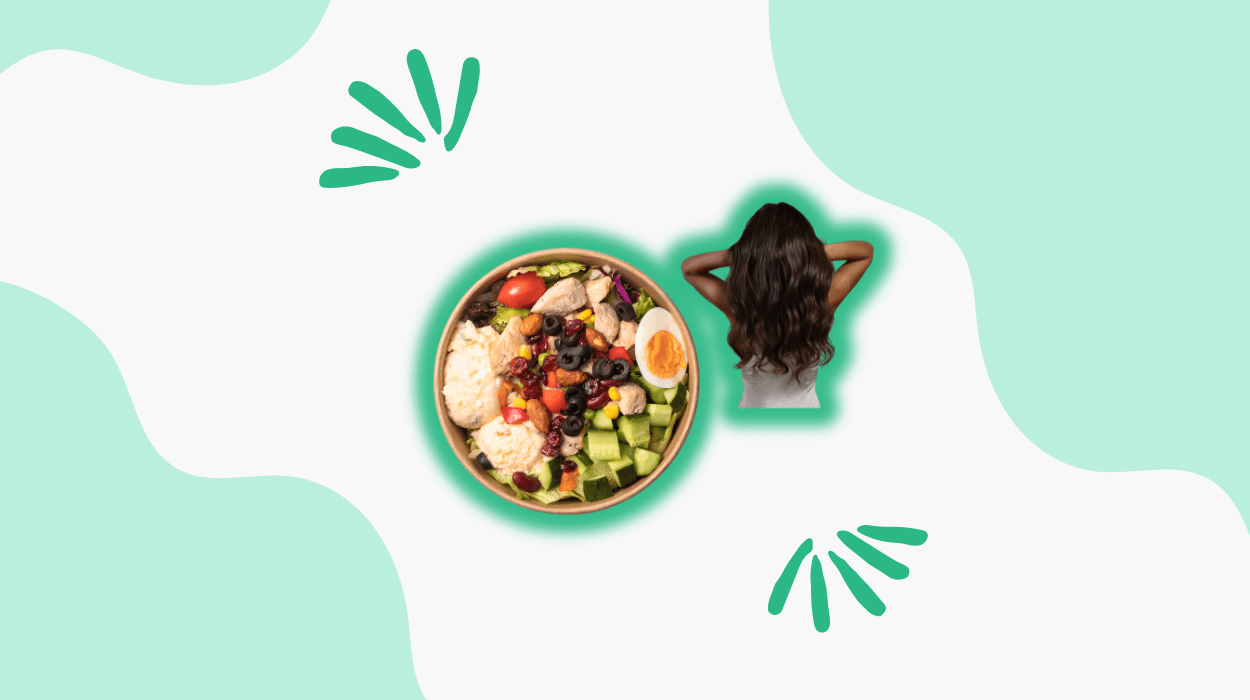

Your hair grows from the hair follicles, which need specific nutrients like iron, vitamins A, E, and C, biotin, and protein from the foods you consume. Lack of these nutrients in your diet might lead to hair loss, brittle hair, or poor hair growth.
Biotin, found in eggs and almonds, may support the production of keratin, a protein that forms the structure of your hair. Iron, present in leafy greens and salmon, could ensure your hair follicles receive adequate oxygen, thereby supporting their growth.
Taking care of your diet may help prevent hair loss and give your hair that extra shine, smoothness, and strength.
Some foods like carrots, walnuts, or avocados could help support scalp health and hair growth. This article explores 19 foods that may nourish your scalp and stimulate healthy hair growth.

Hair is mainly composed of keratin protein. Eggs could provide a high-quality protein source, which may promote the synthesis of new hair cells and the repair of damaged ones. Increased protein consumption through eggs could help maintain strong and healthy hair.
Eggs contain biotin, a B vitamin that may support hair growth. Biotin might help produce keratin and may improve your hair’s strength, thickness, and overall health. Biotin deficiency may result in hair thinning and loss.
The iron content in eggs could help carry oxygen to your hair follicles, which is critical for their growth and repair. Eggs also contain zinc, which may support hair tissue growth and repair and keep the oil glands around the follicles working properly.
Eggs also contain essential nutrients like vitamins A, D, and E, which may nourish your scalp and hair follicles. Vitamin A might promote sebum production, an oily substance that moisturizes your scalp. Vitamin E’s antioxidant effects might shield your hair from oxidative damage.
Spinach contains essential nutrients that may support healthy hair growth, such as iron, vitamins A and C, and folate. Vitamin A could help nourish your scalp and hair by encouraging sebum production. Folate deficiency might trigger hair loss and thinning.
A 100-gram serving of spinach provides 29.2 mg of vitamin C. It may help your body produce collagen, a protein that may strengthen your hair strands. Vitamin C might also improve iron absorption from your diet, enhancing its availability to hair follicles.
The iron content in spinach might help your red blood cells transit oxygen to your hair follicles. Adequate oxygen supply may help support the growth and repair of your hair cells by boosting blood circulation to your scalp.
Spinach also contains antioxidants that may protect your hair follicles against oxidative damage from free radicals. Such protection might help maintain your hair health and prevent premature hair loss.
A 100-gram serving of sweet potatoes contains 8510 µg of beta carotene, 2.4 mg of vitamin C, and 11 µg of folate. Your body may convert beta-carotene into vitamin A, which may enhance sebum production, preventing hair dryness and breakage.
Sweet potatoes contain several B vitamins, including B6 and pantothenic acid. These vitamins might support the metabolism of hair follicle cells and support the production of red blood cells. It could help support healthy hair growth and prevent hair loss.
Sweet potatoes also contain copper, a mineral that might help maintain melanin production, the pigment responsible for hair color. Adequate copper levels may prevent premature graying and contribute to vibrant, healthy-looking hair.
Sweet potatoes have anti-inflammatory properties that could help soothe your scalp and reduce inflammation, which might be contributing factors to hair loss.
A 100-gram serving of avocados comprises 2.07 mg of vitamin E, 81 µg of folate, and 10 mg of vitamin C. It has monounsaturated fats that may help nourish and moisturize your scalp, thereby supporting hair growth.
The vitamin E content in avocados may protect your hair from oxidative damage. It could enhance scalp blood circulation, ensuring that your hair follicles receive ample nutrients and oxygen for growth.
Avocados have amino acids, the building blocks of proteins. These amino acids may support keratin production and might lead to stronger, more resilient hair.
It contains anti-inflammatory compounds like phytosterols and omega-3 fatty acids, which might reduce scalp inflammation. A calm and healthy scalp environment may prevent hair loss and support hair growth.
One cup (95 g) of almonds offers around 20 g of protein, 41.8 µg of folate, and 3.52 mg of iron. The protein content in iron could help repair damaged hair and support the growth of new, strong hair strands.
It contains multiple B vitamins, including B1 (thiamine), B2 (riboflavin), and B3 (niacin). These B vitamins might improve hair health by increasing scalp blood circulation and promoting the growth of healthy hair cells.
Almonds have an alkaline nature, which may help balance the body’s pH levels. An alkaline environment is conducive to healthy hair growth, as it could reduce acidity that may trigger hair problems.
The magnesium content in almonds might support hair growth. Magnesium could help maintain healthy hair follicles and prevent calcium buildup on the scalp, which might lead to hair loss.
A 100-gram serving of salmon provides 20.4 g of protein, 11 µg of vitamin D, and 3.77 g of monounsaturated fatty acids. It contains omega-3 fatty acids, which may nourish your hair follicles and reduce scalp inflammation, conducive to healthy hair growth.
Vitamin D in salmon might support the production of new hair follicles and prevent your hair from becoming thin and brittle. It could also positively influence the hair growth cycle and follicle health.
Astaxanthin, a potent antioxidant in salmon, could help maintain the integrity of your hair follicles. It might help shield your hair cells against oxidative damage and inflammation.
The healthy fats in salmon may help keep your scalp hydrated, preventing dryness and flakiness. A well-hydrated scalp may encourage healthy hair growth, potentially reducing the risk of dandruff and scalp irritation.
One medium-sized tangerine (88 g) contains 75 g of water, 14.1 µg of folate, and 136 µg of beta carotene. The high water content in tangerine might keep your scalp hydrated, thereby preventing issues like dryness and flakiness.
The bioflavonoids in tangerines may increase blood circulation to your scalp, ensuring that your hair follicles receive sufficient nutrients and oxygen. Improved blood flow might support the growth and maintenance of healthy hair.
It contains potent antioxidants, including flavonoids and vitamin C, which might protect your hair follicles against oxidative damage. They may help maintain the integrity of your hair follicles, preventing hair thinning and loss.
A 100-gram serving of Greek yogurt provides 9.95 g of protein, 115 mg of calcium, and 0.6 mg of zinc. The zinc content in Greek yogurt might help maintain the optimal functioning of oil glands around hair follicles, preventing hair loss and dandruff.
Greek yogurt contains vitamin B5, which might help improve scalp blood circulation. Better circulation may ensure that your hair follicles receive sufficient oxygen and nutrients, promoting healthy hair growth.
The lactic acid in Greek yogurt may help cleanse the scalp, eliminating dead skin cells and promoting a healthy scalp environment. A clean scalp might prevent blocked hair follicles and encourage healthy hair growth.
Greek yogurt provides a good calcium source, which is vital for hair growth. Calcium could help synthesize hormones and enzymes that stimulate hair follicles, supporting the growth cycle of hair.
One guava (55 g) contains 44.4 g of water, 126 mg of vitamin C, and 27 µg of folate. Vitamin C in guava could help synthesize collagen, which may strengthen hair strands by maintaining the structure of hair follicles and preventing breakage.
Folate (a B vitamin) in guava may stimulate red blood cell production. Red blood cells may carry oxygen and nutrients to your hair follicles, promoting healthier and stronger hair growth.
Guavas are good sources of potassium and magnesium, minerals that may help maintain electrolyte balance in the body. Proper electrolyte balance might support healthy hair follicle function and prevent hair loss due to imbalances.
Blueberries contain compounds called proanthocyanidins that might stimulate hair follicles and promote new hair growth. They could also promote thicker hair by strengthening the hair shaft and minimizing hair loss.
Anthocyanins in blueberries might enhance blood circulation, including to the scalp. Improved blood flow might help deliver oxygen and nutrients to the hair follicles, which are crucial for healthy hair growth.
Blueberries contain antioxidants and vitamins that may help maintain a clean, moisturized scalp that could be less prone to dryness, dandruff, and other conditions that may disrupt hair growth.
A 100-gram serving of carrots offers 835 µg of vitamin A, 8280 µg of beta carotene, and 5.9 mg of vitamin C. Beta-carotene might help stimulate hair follicles and support hair growth. It might also improve scalp hydration, preventing issues like dryness and flakiness.
Carrots contain silica, a mineral that may help maintain the strength and elasticity of hair. Silica could improve the thickness of hair strands and reduce brittleness, promoting more resilient hair growth.
The fiber content in carrots could help detoxify the body, including the scalp. A clean scalp environment free from toxins and impurities might support optimal hair growth and health.
A 100-gram serving of chickpeas provides 8.86 g of protein, 172 µg of folate, and 0.35 mg of vitamin E. Protein intake from chickpeas could support the growth of strong, healthy hair strands and help repair damaged hair.
Folate is important for cell growth and renewal, including the cells in hair follicles. Chickpeas provide folate, which might support the regeneration of hair cells and contribute to healthy hair growth.
Chickpeas contain iron and zinc, minerals that may optimize hair health. Iron may encourage hair growth and help minimize the likelihood of hair loss due to iron deficiency (anemia). Zinc may support hair growth and repair, thereby preventing hair thinning.
Walnuts are a rich plant-based source of omega-3 fatty acids, particularly alpha-linolenic acid (ALA). Omega-3s may nourish hair follicles and support scalp health by reducing inflammation and promoting circulation.
They contain monounsaturated and polyunsaturated fats, which could help moisturize the scalp and hair strands that might be less prone to breakage.
Walnuts also contain copper, which could support melanin production, the pigment that imparts hair its color. Adequate copper levels might contribute to healthier hair growth and help prevent premature graying.
A single serving (45 g) of peanut butter contains 10.1 g of protein, 4.1 mg of vitamin E, and 38.7 µg of folate. Hair follicles require adequate protein to produce strong, healthy hair strands. Peanut butter may help contribute to protein intake, supporting hair growth.
Vitamin E in peanut butter might protect hair follicles against free radical-induced oxidative damage. It might also boost blood circulation to the scalp, ensuring that hair follicles receive adequate nutrients and oxygen for healthy growth.
Peanut butter contains omega-6 fatty acids, which could help maintain the natural lipid barrier of the scalp. A healthy scalp barrier might prevent moisture loss and protect hair follicles from damage, creating optimal conditions for hair growth.
Capsaicin, the active compound in red pepper, may increase blood circulation in the scalp. The heat from red peppers may help open up the scalp pores, supporting better absorption of hair growth-promoting nutrients.
Red pepper contains vitamins A and C, which are vital for hair health. Vitamin A might help increase sebum production, the oily substance that keeps hair moisturized. Vitamin C could stimulate collagen production, which may strengthen hair strands.
Capsaicin might help prevent the miniaturization of hair follicles, which is a contributor to pattern baldness. Red pepper may stimulate thicker and stronger hair strands by maintaining the size and health of hair follicles.
A 100-gram serving of whole grain cereals provides 27.5 mg of iron, 10.2 g of protein, and B vitamins like niacin (B3) and biotin (B7). These B vitamins could support the regeneration of hair cells, helping improve the strength and resilience of hair strands.
Whole grain cereals are a good source of non-heme iron. It could support the health of hair follicles and stimulate hair growth by ensuring they receive adequate oxygen and nutrients.
It contains antioxidants like selenium and vitamin E, which may protect hair follicles from oxidative damage and inflammation. Such protection might help maintain healthy hair growth cycles.
A 100-gram serving of black beans contains 8.86 g of protein, 149 µg of folate, and 70 mg of magnesium. The folate content in black beans may support DNA synthesis and cell division, which could stimulate the growth of new hair follicles.
Magnesium in black beans might help improve scalp health by stabilizing calcium levels. Proper calcium regulation may prevent calcium buildup on the scalp, which may otherwise clog hair follicles and disrupt hair growth.
Black beans also contain phosphorus, which could help in energy production and storage. Adequate energy levels are necessary for all cellular processes, including those involved in hair growth.
A 100-gram serving of boneless chicken breast may provide 32.1 g of protein, 343 mg of potassium, and 0.33 mg of vitamin E. Chicken provides essential amino acids like cysteine and methionine, which could improve hair strength and structure, reducing breakage.
Chicken, especially bone broth made from chicken bones, is a good collagen source. Collagen could help support the structure of hair follicles and improve hair strength and elasticity.
It contains B vitamins, such as niacin (B3), biotin (B7), and vitamin B6. These B vitamins could help support cellular metabolism and improve the health and growth rate of hair.
Fenugreek seeds contain compounds that might suppress dihydrotestosterone production, a hormone associated with hair loss. Fenugreek seeds may help prevent hair thinning and loss by lowering DHT levels.
Lecithin, a compound in fenugreek seeds, may act as a natural emollient. It could help retain moisture in the scalp and hair, making them less prone to breakage and split ends.
Fenugreek seeds’ mucilage content could function as a natural conditioner, making the hair smooth, shiny, and more manageable. It might help minimize hair breakage and promote healthy hair growth.
You might experience hair loss at some point in your life, whether due to aging, lifestyle factors, or nutrient deficiencies. When it comes to targeting hair growth, the importance of consuming a nutritious diet cannot be ignored.
Proteins and amino acids are fundamental for keratin production, the protein that forms your hair strands. Hydration, both from diet and fluid intake, is vital for maintaining the moisture balance in hair and scalp, which could prevent dryness and brittleness.
Massaging your scalp regularly, trimming split ends periodically, and avoiding heat styling tools could help support hair growth and prevent breakage. Avoiding excessive hair brushing and using natural hair remedies like aloe vera or coconut oil could also be helpful.
Tyler Read earned an undergraduate academic degree from Sonoma State University, California and is a certified personal trainer (CPT) with NASM (National Academy of Sports Medicine). With over 16 years of experience, Tyler has trained clients both online and in-person.
He is passionate about helping others turn their love for fitness into a career. Tyler has worked with many local and commercial gyms before establishing his successful private personal training business, which he continues to operate.
